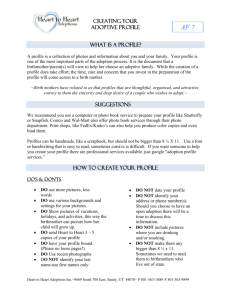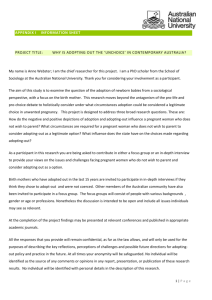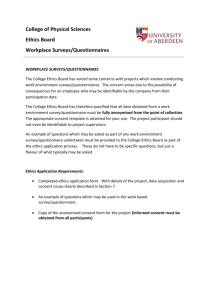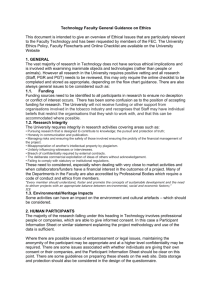Saloni Dosani Ethics submission - PAC-UK
advertisement
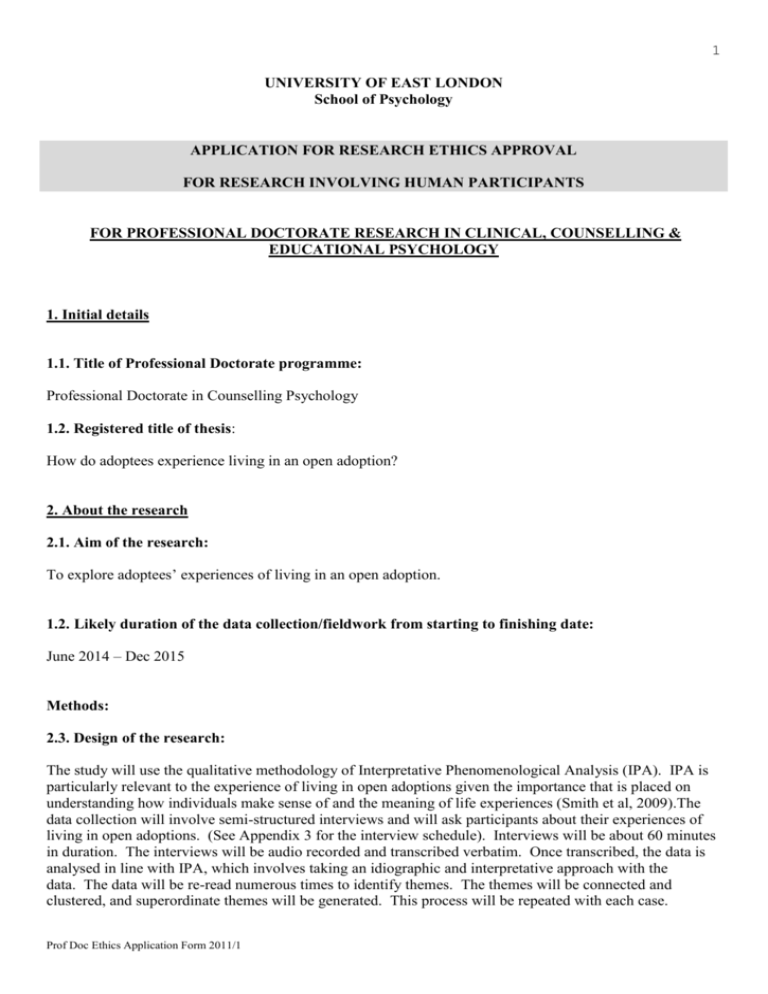
1 UNIVERSITY OF EAST LONDON School of Psychology APPLICATION FOR RESEARCH ETHICS APPROVAL FOR RESEARCH INVOLVING HUMAN PARTICIPANTS FOR PROFESSIONAL DOCTORATE RESEARCH IN CLINICAL, COUNSELLING & EDUCATIONAL PSYCHOLOGY 1. Initial details 1.1. Title of Professional Doctorate programme: Professional Doctorate in Counselling Psychology 1.2. Registered title of thesis: How do adoptees experience living in an open adoption? 2. About the research 2.1. Aim of the research: To explore adoptees’ experiences of living in an open adoption. 1.2. Likely duration of the data collection/fieldwork from starting to finishing date: June 2014 – Dec 2015 Methods: 2.3. Design of the research: The study will use the qualitative methodology of Interpretative Phenomenological Analysis (IPA). IPA is particularly relevant to the experience of living in open adoptions given the importance that is placed on understanding how individuals make sense of and the meaning of life experiences (Smith et al, 2009).The data collection will involve semi-structured interviews and will ask participants about their experiences of living in open adoptions. (See Appendix 3 for the interview schedule). Interviews will be about 60 minutes in duration. The interviews will be audio recorded and transcribed verbatim. Once transcribed, the data is analysed in line with IPA, which involves taking an idiographic and interpretative approach with the data. The data will be re-read numerous times to identify themes. The themes will be connected and clustered, and superordinate themes will be generated. This process will be repeated with each case. Prof Doc Ethics Application Form 2011/1 2 2.4. Data Sources or Participants: 8- 10 adoptee participants will be interviewed. Participants will be included on the basis that they are male or female, aged 18 or above, placed voluntarily for adoption, placed for adoption before their first birthday, their adoptive parents have remained married post adoption and they have lived in fully disclosed open adoptions from birth (defined as having ongoing face to face contact between the adoptee and birthmother). Participants will be excluded if they were involved in public, international or transracial adoptions, if they cannot provide informed consent or require an interpreter. Interviews will take place at University of East London (UEL) or alternative confidential settings. Participants will be recruited using purposive sampling via referrals, snowballing, adoption support groups and forums (for example, Adoption UK and After Adoption. Prior permission will be obtained). 2.5. Measures, Materials or Equipment: An interview schedule and an audio- recorder will be used during this interview. Interview questions are listed below. 2.6. Outline of procedure, giving sufficient detail about what is involved in the research: Procedure involves: Giving the participants an invitation letter that outlines the nature and purposes of the research and participants’ rights. (and giving them time to digest and think about this) If they agree to participate at a later date, giving them a consent form to sign before interviewing them. Interviews will last for about 60 minutes. Interviews will be audio-recorded and transcribed for analysis. Interviews will take place at University of East London (UEL) or alternative confidential settings. If interviews are held in participants’ homes, I will for my safety let someone know when and where I will be conducting each interview. 3. Ethical considerations 3.1. Obtaining fully informed consent: This will be done by following up the invitation letter with a consent form for participants to sign before I interview them. 3.2. Engaging in deception, if relevant: The proposed research involves no deception. 3.3. Right of withdrawal: Prof Doc Ethics Application Form 2011/1 3 Participants will be advised of their right to withdraw from the research study at any time without disadvantage to them and without being obliged to give any reason. Should participants withdraw from the study, their transcripts and audiotapes will be destroyed. This will be made clear to participants on the invitation letter sent to them. 3.4. Anonymity & confidentiality: Will the data be gathered anonymously? NO If NO, what steps will be taken to ensure confidentiality and protect the identity of participants? Participants will be reassured that any information they provide will remain confidential and any identifying details will remain anonymous as they will be referred to by pseudonym. Also, in paper transcripts as well as audiotapes they will be referred by their pseudonym as opposed to ‘adoptee’ in order to maintain anonymity. The transcripts will be stored in a locked cupboard and the audio recordings will be stored in password protected documents on a laptop and kept within the researcher’s home. Participants will be made aware that audio recordings will be read by myself and my supervisor and audio recordings will be destroyed upon completion of the study. 3.5. Protection of participants: Given the sensitivity of the research, participants will be made aware of the potentially emotional responses that the interview may evoke. I will be mindful of participants becoming upset or distressed. They (and all participants) will be provided with details of relevant support organisations should they wish to access these services (Adoption UK and Barnardo’s). 3.6. Will medical after-care be necessary? NO 3.7. Protection of the researcher: I will ensure that I will let someone know where I will be before an interview and use a mobile phone to let that person know when I have finished the interview and left the house. 3.8. Debriefing: Participants will be given the opportunity to ask questions or raise concerns at the end of the interview. They will be reassured about how their interview data will be used and to check that they are still comfortable with participating. 3.9. Will participants be paid? No, the incentive to participants is that they are contributing to the production of knowledge 3.10. Other: Prof Doc Ethics Application Form 2011/1 4 None 4. Other permissions and clearances 4.1. Is ethical clearance required from any other ethics committee? NO 4.2. Will your research involve working with children or vulnerable adults?* NO 5. Signatures ELECTRONICALLY TYPED NAMES WILL BE ACCEPTED AS SIGNATURES BUT ONLY IF THE APPLICATION IS EMAILED TO THE HELPDESK BY YOUR SUPERVISOR 5.1. Declaration by student: I confirm that I have discussed the ethics and feasibility of this research proposal with my supervisor(s). I undertake to abide by accepted ethical principles and appropriate code of conduct in carrying out this proposed research. Personal data will be treated in the strictest confidence and participants will be fully informed about the nature of the research, what will happen to their data, and any possible risks to them. Participants will be informed that they are in no way obliged to volunteer, should not feel coerced, and that they may withdraw from the study without disadvantage to themselves and without being obliged to give any reason. . Student's name: SALONI DOSANI Student's signature: SALONI DOSANI Student's number: u0914456 Date: 19/05/2014 5.2. Declaration by supervisor: I confirm that, in my opinion, the proposed study constitutes a suitable test of the research question and is both feasible and ethical. Supervisor’s name: Supervisor’s signature: Prof Doc Ethics Application Form 2011/1 Date: 5 PARTICIPANT INVITATION LETTER UNIVERSITY OF EAST LONDON School of Psychology Stratford Campus Water Lane London E15 4LZ The Principal Investigator(s) Saloni Dosani (u0914456@uel.ac.uk). Dr David Kaposi (d.kaposi@uel.ac.uk) Consent to Participate in a Research Study The purpose of this letter is to provide you with the information that you need to consider in deciding whether to participate a research study. The study is being conducted as part of my Professional Doctorate in Counselling Psychology course at the University of East London. Project Title How do adoptees experience living in an open adoption? Project Description The aim of this research project is to explore adoptee’s experiences of living in an open adoption. Participants will be interviewed regarding their experiences of having contact with their birthmother and the impact of this relationship. Participants will be interviewed on the basis that they are aged 18 or above, were placed voluntarily for adoption, were placed for adoption before their first birthday, have adoptive parents who are still married and have had ongoing face to face contact with their birthmother since birth. Participants will be excluded if they were involved in public, international or transracial adoptions, if they cannot provide informed consent or require an interpreter. The sensitivity of the research may evoke emotional responses, however you will be provided with details of relevant services should you wish to access them. Interviews will last approximately 60 minutes and will take place at the University of East London or another alternative confidential location. Interviews will be audio recorded and transcribed. However participants will be referred to by pseudonym in the audio recordings as well as the transcript, to protect anonymity and to maintain confidentiality. The transcripts will be stored in a locked cupboard and the audio recordings will be stored in password protected documents on a laptop and kept within the researcher’s home. Audio recordings and transcripts will be read by myself and my supervisor, and the audio recordings will be destroyed upon completion of the study. You are not obliged to take part in this study and should not feel coerced. You are free to withdraw at any time. Should you choose to withdraw from the study you may do so without disadvantage to yourself and without any obligation to give a reason. Should you withdraw, your transcripts and audio recordings will be destroyed. Prof Doc Ethics Application Form 2011/1 6 Please feel free to ask me any questions. If you are happy to continue you will be asked to sign a consent form prior to your participation. Please retain this invitation letter for reference. If you have any questions or concerns about how the study has been conducted, please contact the study’s supervisor [Dr David Kaposi, School of Psychology, University of East London, Water Lane, London E15 4LZ., 0208 223 2946, d.kaposi@uel.ac.uk] or Chair of the School of Psychology Research Ethics Sub-committee: Dr. Mark Finn, School of Psychology, University of East London, Water Lane, London E15 4LZ. (Tel: 020 8223 4493. Email: m.finn@uel.ac.uk) Thank you in anticipation. Yours sincerely, Saloni Dosani 12th May 2014 Prof Doc Ethics Application Form 2011/1 7 CONSENT FORM UNIVERSITY OF EAST LONDON Consent to participate in a research study How do adoptees experience living in an open adoption? I have the read the information sheet relating to the above research study and have been given a copy to keep. The nature and purposes of the research have been explained to me, and I have had the opportunity to discuss the details and ask questions about this information. I understand what is being proposed and the procedures in which I will be involved have been explained to me. I understand that my involvement in this study, and particular data from this research, will remain strictly confidential. Only the researcher(s) involved in the study will have access to identifying data. It has been explained to me what will happen once the research study has been completed. I hereby freely and fully consent to participate in the study which has been fully explained to me. Having given this consent I understand that I have the right to withdraw from the study at any time without disadvantage to myself and without being obliged to give any reason. Participant’s Name (BLOCK CAPITALS) ………………………………………………………………………………………. Participant’s Signature ……………………………………………………………………………………….. Researcher’s Name (BLOCK CAPITALS) ……………………………………………………………………………………….. Researcher’s Signature ………………………………………………………………………………………… Date: ……………………..……. Prof Doc Ethics Application Form 2011/1 8 OTHER ATTACHMENTS Interview Schedule Can you tell me about your experience of growing up with your birthmother in your life? Can you tell me about your relationship with your birthmother? How do you feel when you meet your birthmother? How do you feel between the times that you meet your birthmother? How do think having a relationship with your birthmother has affected you? How do you think having a relationship with your birthmother has affected your relationship with your adoptive parents? What is your perception of a family? What do you think your life might be like if you didn’t have a relationship with your birthmother? Has your relationship with your birthmother changed at times? How did you relationship with your birthmother progress? Prof Doc Ethics Application Form 2011/1
